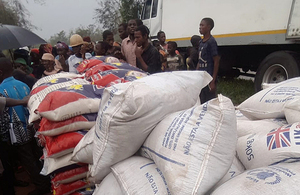UK to provide up to £3 million of UK aid to support victims of Cyclone Kenneth
The UK is to send tents and shelter kits to Mozambique for immediate distribution, to help provide immediate shelter for up to 33,000 people.

Food funded by UK aid is distributed by WFP to people affected by cyclone Kenneth in Macomia, Mozambique, 28 April 2019. Picture: WFP
The UK will provide up to £3 million of UK aid to support the victims of Cyclone Kenneth which hit northern Mozambique and southern Tanzania late last week, International Development Secretary Penny Mordaunt announced (29 April).
Cyclone Kenneth has destroyed thousands of homes and displaced tens of thousands of people, coming just weeks after Cyclone Idai hit southern Mozambique, Malawi and Zimbabwe. Further flooding is expected.
The UK is due to send tents and shelter kits to Mozambique for immediate distribution, to help provide immediate shelter for up to 33,000 people forced to flee their homes.
Four UK aid experts have also arrived in Pemba, Mozambique, the centre of the response which has already experienced more than two metres of rain and flooding, to determine how aid can be delivered as quickly as possible to those affected and to assess what further aid is needed.
International Development Secretary Penny Mordaunt said:
It is terrible to see the devastation that Cyclone Kenneth has brought to the people of Mozambique and Tanzania, as the region still reels from the aftermath of Cyclone Idai.
The UK is well prepared to respond and I have made £3 million of UK aid available to provide emergency aid to those who have lost their homes and livelihoods.
We already have experts on the ground assessing the situation, and are due to send out more shelter kits and tents. World Food Programme supplies funded by UK aid means food is already getting to those in need.
In addition to today’s new support, UK aid has been partnering with UK experts at the Met Office, University of Reading and University of Bristol, as well as the European Centre for Medium-Range Weather Forecasts (ECMWF), to use cutting-edge satellite technology to predict which areas are most vulnerable to flooding. It was used for the first time in response to Cyclone Idai.
UK aid is using this state-of-the-art flood risk analysis to guide its preparations and response, and is sharing information with partners to allow them to do the same. This includes the UN Office for Coordination of Humanitarian Affairs (UN OCHA), the Mozambique Disaster Management Team (INGC) and NGOs delivering aid on the ground.
Notes to editors
- Today’s announcement of up to £3 million of UK aid is new money from the CHASE Contingency Fund.
- The Government of Mozambique has indicated at least 38 confirmed deaths so far, with 3,000 houses destroyed and 32,000 partially destroyed. Over 100,000 people are estimated to be displaced from their homes in the north of the country.
- The UK expects to send up to 100 tents, up to 6,500 shelter kits and 1,750 large plastic sheets for emergency shelter to Mozambique on 30 April. This is based on DFID’s ability to transport the items and assessment of needs on the ground. This could change as the situation on the ground evolves.
- There are four UK aid experts in Pemba currently assessing the developing humanitarian need and determining how aid can best be delivered to those affected by flooding.
- DFID is using the latest flood risk analysis to guide its distribution and coordination of aid in response to Cyclone Kenneth and to understand where the weather will have the greatest impact.
ENDS
General media queries (24 hours)
Email mediateam@dfid.gov.uk
Telephone 020 7023 0600
If you have an urgent media query, please email the DFID Media Team on mediateam@dfid.gov.uk in the first instance and we will respond as soon as possible.